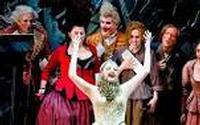The Rake’s Progress, Igor Stravinsky’s only full-length opera was judged a disappointment when it premiered in 1951 but is now widely regarded as the culminating work in the composer’s “neoclassical” period. Its entertaining and clever libretto is signed W. H. Auden and Chester Kallman and the story inspired by a series of 18th century engravings by William Hogarth, which depict the hellish journey of an idle rich libertine.
Protagonist Tom Rakewell is young, inexperienced and reckless. While he revels with Anne Trulove in spring fever, the girl's father is concerned about his daughter’s proposed marriage. Tom refuses to accept his offer of a regular job however and dreams of a great career. His dream seems to come true when Nick Shadow appears to tell him that an unknown uncle has left him a substancial inheritance. All that is necessary is a trip to the big city. Accompanied by Nick Shadow as his servant and driven by new desires, Tom embarks on a trip from which he never returns, squanders all his fortune and loses control of his life.
For director David Bobée, known to Luxembourg audiences from the magnificent Dios Proveerá last season, The Rake’s Progress will be his first opera. The Faustian myth and the question what it would mean today to make a pact with the devil inspired him to take on the project and he would like to show how a social climb may also be assimilated to a descent into hell.
Upcoming British tenor Benjamin Hulett and Swedish soprano Marie Arnet, who only last year made her Royal Opera House debut, take the lead roles in this coproduction with four other houses: Opéra de Limoges, Opéra de Reims, Opéra de Rouen and long-term partner théâtre de Caen.
Cast and Creative team for The Rake's Progress at Les Théâtres de la Ville de Luxembourg, Grand Théâtre
Direction David Bobée
Set design consultant Marc Laine
Costumes Stéphane Barucci
Video Wojtek Doroszuk & José Gherrak
Lighting Design Stéphane Babi Aubert
Set & costumes made in the workshops of Opéra de Limoges
Tom Rakewell, a Rake Benjamin Hulett
Anne Trulove, his Betrothed Marie Arnet
Baba the Turk, a Bearded Lady Isabelle Druet
Nick Shadow Kevin Short
Sellem, an Auctioneer Colin Judson
Mother Goose, a Whore Kathleen Wilkinson
Father Trulove, Anne's Father Stephan Loges
Chorus Opéra de Limoges
Orchestra Orchestre Régional de Normandie


